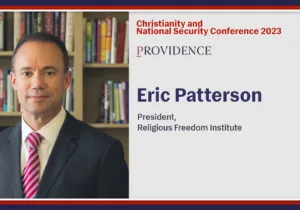For the better part of three decades, First Things journal (hereafter FT) has been a reliable place for Christians to go in search of social and political commentary by some of the leading minds in evangelical Protestant and Catholic Christianity. Founded in 1990 by Father Richard John Neuhaus, the journal quickly acquired a reputation for its ecumenical content and gracious tone. It exhibited a rare combination of intellectual rigor and deep religious commitment with an inviting and irenic spirit. The enemy, insofar as there was one, was intellectual vice, not other Christians or the wider population. In short, FT addressed pressing contemporary issues from a Christian theological perspective without demonizing the opposition.
I first encountered FT when I went to work for William J. “Billy” Abraham in the late 1990s. As the assistant to the Outler Chair in theology at Southern Methodist University, one of my daily jobs was to retrieve Billy’s mail. Once a month, I found myself reading the latest issue of FT on my way back from the mailroom. Often, I would read it cover to cover before handing it over. Here was a journal that modeled the intellectual virtues that Billy so frequently talked about: fairness in argument, careful consideration of evidence, avoiding logical fallacies, patience in exercising judgment, open-mindedness, humility, and empathy.
The content being published under the banner of FT today exhibits almost none of these qualities. Gone are the ecumenical tone and irenic spirit. Gone, too, is the commitment to intellectual virtue. In place of the things for which Father Neuhaus and FT were once standard bearers, one now finds essays clearly calculated to polarize and offend (if they are not so calculated, then their authors are unrivaled in their lack of self-awareness). FT now exhibits open hostility toward other Christians and the wider population. It is no longer winsome and inviting. It is no longer evangelical. Rather, the mindset of many of its authors, most notably its senior editor, R.R. Reno, strikes me as that of an angry and bitter remnant. They write as though they are the last Christians in America.
Consider the views that Reno and others have expressed in the pages of FT over the last couple of weeks. In a series of essays that are intellectually vicious in their criticism of the response to the global pandemic (especially the response of Christians), the authors divide the world into two groups of people. On the one hand are those who worship God, care deeply about virtue, and know that death doesn’t have the final say. Such people are the true Christians, and they are a picture of calm during the present so-called “crisis.” Because of the steadfastness of their convictions, they don’t lose their wits. They are faithful. They don’t overreact. (It is surely no accident that Reno’s daily “Coronavirus Diary” amounts to a self-portrait in knowing calmness—he walks his dog, stops by an empty cathedral to pray, goes to his office, and returns home.)
On the other hand, the rest of us are hunkered down in our homes, terrified of death and dying because we are materialists who no longer believe in God or in life after death. We would do anything to prolong mere “physical life,” because that is all we have left. We are materialists, atheists, idolaters, or worst of all, dishonest Christians (“Christian leaders,” says Reno, “secretly accept the materialist assumptions of our age”). We are even told that we don’t “petition God” anymore, choosing instead to place all our hope in science and technology. Nor do we care whether the scientists to whom we turn for hope are themselves virtuous people. We’re too lathered up in a panic to be worried about such high and lofty things. The same goes for our blind and irrational trust in the government. Unlike true Christians, we are so afraid of death and dying that we can’t even bring ourselves to speak death’s name. We prefer to speak of “saving lives” rather than “delaying death.”
The intellectual viciousness of these and other essays is truly stunning. For starters, these false dichotomies are clearly willful. They must know that the entire world cannot be divided into two groups of people based solely on whether they embrace their respective governments’ guidelines during a pandemic, with one group representing courage and fidelity to God and the other infidelity and fear. They have to know that there are plenty of devout Christians (and faithful adherents of other world religions for that matter) whose embrace of social distancing and self-quarantine in the face of a pandemic does not reveal “secret” lives of idolatry and impiety. They can’t really be that uncharitable, can they? Then again, they seem perfectly content to make all sorts of assertions without offering a shred of evidence. They simply know the contents of people’s minds and hearts. They know what the rest of us believe, what motivates us, what we fear, what we value, and so on. These assertions are not just unfounded and inflammatory; they are arrogant and absurd. The fact that I wear a seatbelt when riding in a car or have smoke detectors in my house does not mean that I’m afraid to die, much less that I have ceased to believe in or worship God.
Theologically speaking, the attack on “physical life” is equally stunning. Indeed, if there is a dichotomy to be laid bare here, it is between materialism and Gnosticism. At times, Reno and company disparage “physical life” to such a degree that one wonders how their views can be made to cohere with the doctrines of creation, the incarnation, and the sacraments. But I digress.
In conclusion, I may be wrong to suggest that a bitter remnant mindset has taken hold of the leadership of FT. But if I’m wrong, what else might explain the sheer amount of intellectual vice on display of late? The alternative, I suppose, is that they have simply lost touch with reality. And this possibility has to be considered. In “We Love Big Brother,” Peter Hitchens repeatedly claims that those of us who are taking heed of governmental guidelines—guidelines based on the recommendations of leading epidemiologists and infectious disease experts (yes, I used that word)—are irrational. We are so far gone when it comes to reason, he says, that he might as well be “reading Russian verse to an audience of koalas.” This, mind you, is just before he declares that, because of their coronavirus policies, England and Britain are “now gone.” They are “nothing more than geographical descriptions of a patch of land, into which some ugly new thing, its hour come round at last, will shortly slouch.”
I am tempted to respond that it is FT that is “now gone”—that it is nothing more than a banner under which an “ugly new thing” already resides. But my ultimate desire is to see Father Neuhaus’ legacy of welcoming ecumenical dialogue and winsome political theology extended to a new generation of Christians. And that requires me to resist the temptation to make such a harsh and final judgment. The world will survive the coronavirus, and so will FT. The question is, How will our responses to the virus now shape our life together then? FT has a proud legacy of bringing people together to confront difficult issues. My fervent prayer is that they will recover that legacy before it’s too late.





